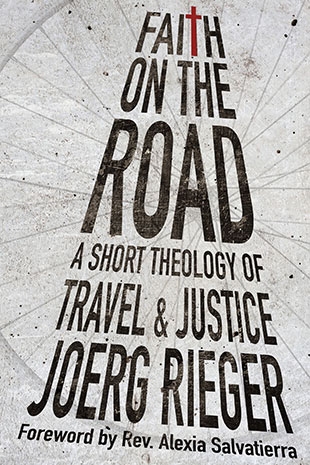"Christianity is not primarily a matter of pews and buildings; Christianity is a matter of the road,” writes Joerg Rieger, Wendland-Cook Professor of Constructive Theology at Perkins School of Theology, Southern Methodist University. The author sees movement and constant relocation as crucial to following Jesus as people on the way. In this adventuresome and well-realized paperback, we are treated to theological reflections on travel; a rounded look at travel experiences, tourism, and migration; challenges from the road pilgrims and vagabonds; and journeys beyond religious tourism, such as short-term mission trips. Behind all these forms of travel lies a spiritual vision of them as acts of justice.
An earlier and shorter version of Faith on the Road appeared in the series Christian Explorations of Everyday Living published by Fortress Press. Rieger shows how the Bible is not a static book but a dynamic collection of journeys, shifts, and exiles. It is full of profound stories of migrants, colonized peoples, and prophets. Of course, Jesus himself spent most of his life on the road.
Rieger counsels us to listen to a traveling God of Mystery and movement as we experience our journey of faith: "A whole new way of looking at the world, at others and at ourselves emerges when we begin to think from the perspective of the road. Things will never be the same."
In this era of globalism, travel offers us varied opportunities to expand our horizons, to transcend narrow-mindedness, and to feel in our bones the benefits of empathy and solidarity with strangers. The author does a good job exploring pilgrimage as an early form of itinerant devotion which has now shifted to a search for authenticity and self-renewal through the alchemy of place.
Vagabonds are free spirits who shun the status quo and search for the sacred. Rieger examines three examples of this approach in the travels of the Beat poet Jack Kerouac, the trips of novelist John Steinbeck in Travels with Charley, and the adventures of Che Guevara on the road in Latin America.
In a fascinating chapter, the author points to some of the problems with short-term mission trips and immersions, two examples of popular religious tourism. Riegert recommends what he calls “the urban ministry alternative.” Near the end of the book, he points out the value of doing theology on the road (an informal and improvising form of questing) and engaging in acts of justice. These two paths help us "overcome the dangers of static approaches and the commodification of particular locations and issues, which usually happens in service of the status quo."
